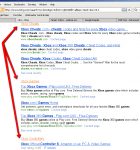In the past few days, many posts have been published about Bing. That’s because on the 24th of August, the engine has finally completed the “merge” of its algorithms with Yahoo!, and started providing results generated by a common algorithm for both the search engines, which estimates about 20% of the daily internet users (at least in the EMEA).
This is not of great numbers of course, and the partnership between the two search engines is meant to find a way to reverse the situation. Not an easy task, especially if we consider the user loyalty that always last to die. We have many examples of this, once for all Firefox vs. Internet Explorer.
And this minority I think is the reason why the new Bing feature has been under discussed. To be honest, it looks like anybody is aware of it, because no one of the blogs in my RSS reader has mentioned it.
I’m talking about the expanded results of Bing.
 As you can see from image below, this is a feature that automatically expands the search engine results for certain queries (at the moment it seems that only those brands are subject to this).
As you can see from image below, this is a feature that automatically expands the search engine results for certain queries (at the moment it seems that only those brands are subject to this).
Once you searched for a specific brand or product, Bing proposes a list of 7 results plus the last three in an expanded way. Such results include the first three items of the given query plus an additional keyword.
The result is a page longer than expected, but the results ultimately are always 10 - obviously excluding the subqueries.
For each set of results will then be possible to consult the full SERP, through links placed at the bottom of each group.
This feature is partially comparable to the recent Google algo change which - for very high traffic brands and items - returns the top 7 results from the same web site, rather than the original result and the aggregate when this was available.
 It is hard to say who has copied whom, but within the absence of an official communication from Bing about the expanded results feature, I guess that this time Google deployed the “top 7” after Bing introduced its own expanded results.
It is hard to say who has copied whom, but within the absence of an official communication from Bing about the expanded results feature, I guess that this time Google deployed the “top 7” after Bing introduced its own expanded results.
As a personal comment as a SE operator, I find the Bing’s feature smarter and less invasive than Big G solution.
And you, what do you think about?

